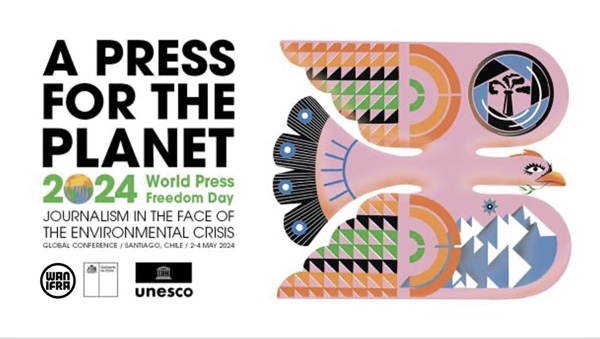Business News
WAN-IFRA signs the Santiago + 30 Declaration

Wednesday 08. May 2024 - International and national organisations advocating for press freedom signed the Santiago + 30 Declaration in Santiago, Chile. The statement addresses new political, social, and technological challenges journalism faces.
We see a powerful display of unity and collaboration among the signatory entities. The Inter-American Press Association (IAPA), the World Association of News Publishers (WAN-IFRA), the Committee to Protect Journalists (CPJ), and national media associations from nine countries in Latin America and Europe, including Spain, Portugal, Argentina, Chile, Brazil, Colombia, Mexico, Peru, and Ecuador, have all come together for this cause.
Gathered at a meeting organized by the National Press Association at the Catholic University of Chile, journalistic entities propose a fresh perspective on the ‘Santiago Declaration’ published in 1994 in the Chilean capital under the auspices of UNESCO. The ‘Santiago + 30 Declaration’ is not a replacement for the original declaration, but a continuation and evolution of its principles and commitments. The aim is to reaffirm the ‘commitment to a free press, vibrant public discourse, and the flourishing of democratic societies in Ibero-America and the Caribbean.’
The “Santiago + 30 Declaration” emerges within the context of a meeting convened again by UNESCO in this city to celebrate World Press Freedom Day. In 1994, UNESCO held World Press Freedom Day under the theme “Media Development and Democracy in Latin America and the Caribbean”. Thirty years later, the meeting’s focus is “Journalism in the face of the environmental crisis.”
Journalistic associations contribute to the debate on our freedoms, democracy, and the sustainability of the journalistic industry. This was also the case in 2021 with the “Windhoek Declaration + 30,” a document addressing the challenges of digital media transformation – in Africa in that instance – and the impact of major technology companies and social networks on freedom of expression.
The ‘Santiago + 30 Declaration’ content will be presented during the conference cycle organized by UNESCO, particularly during the panel titled ‘Perspectives on updating the Santiago Declaration for the new era,’ scheduled for Friday, May 3, at the Gabriela Mistral Cultural Center in Chile. The panel, featuring WAN-IFRA President Fernando De Yarza López-Madrazo and IAPA President Roberto Rock, will provide a platform for further discussion and action on the ‘Santiago + 30 Declaration ‘, ensuring that the initiative continues to evolve and adapt to the changing media landscape.
The ‘Santiago + 30 Declaration’ is not just a statement, but a call to action. It urges States, intergovernmental organisations, technology companies, media outlets, and journalism, in general, to undertake a collaborative effort. This effort is aimed at consolidating freedom of expression as a fundamental human right and the cornerstone of informed and democratic societies, ensuring a brighter future for journalism.
Among its highlights, the document calls on States to avoid narratives of political polarization, protect journalists, ensure the free flow of information and access to public information, support the sustainability of independent journalism, and encourage balanced negotiation conditions between media outlets and technological companies for content distribution.
It also calls on intergovernmental organisations to promote public policies in favour of a plural and independent press, encourage the creation of media outlets in rural areas, and promote public campaigns for media and digital literacy.
To technology companies, it urges transparency in content moderation policies, combating disinformation, respecting copyright and intellectual property laws, exploring new sustainable business models for all parties, ensuring fair compensation for news content they distribute, and observing competition principles in the advertising ecosystem.
Media outlets and journalists are urged to resist censorship, self-censorship, and undue influence, uphold principles of quality and transparency, create safety protocols for their personnel, and strengthen their gender, racial, and diversity inclusion policies. They are also encouraged to explore new business models and tools for greater sustainability.
Signatories of the declaration include the following organisations:
World Association of News Publishers (WAN-IFRA); Inter American Press Association (IAPA); Committe to Protect Journalists (CPJ); Associação Nacional de Jornais (ANJ-Brasil); Asociación de Entidades Periodísticas Argentinas (Adepa); Asociación Nacional de la Prensa (ANP-Chile); Asociación Colombiana de Medios de Información (AMI); Asociación de Medios de Información (AMI-España); Associação Portuguesa de Imprensa (APImprensa); Alianza de Medios Mx (México); Consejo de la Prensa Peruana (CPP) y Asociación Ecuatoriana de Editores de Periódicos (Aedep).
